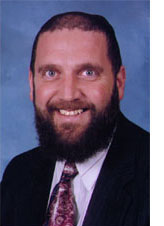By Rabbi Baruch Lederman
 SAN DIEGO — “On the tenth of this month they shall take for themselves a lamb…” (Ex. 12:3)
SAN DIEGO — “On the tenth of this month they shall take for themselves a lamb…” (Ex. 12:3)
It took great courage for the Jews to bring the Korbon Pesach (Passover Offering), as Moshe (Moses) had commanded them in the name of Hashem (G-d). The lamb was worshiped by the Egyptians. One could easily be afraid of retaliation. Still the Jews had faith and knew that if they followed Moshe’s dictates, Hashem would watch out for them – as the following true story illustrates:
Jack & Miriam Stein (not real name) were a young couple in New York, with a fledgling real estate business, struggling to get by and support a family. The Steins bought a new house. The owner inherited it from his recently departed mother. “Take the house as is, I don’t want any part in repairing or improving it. That is the deal,” explained the seller.
The house was a massive fixer upper, full of furniture and chatchkes (knick-knacks) that they didn’t want, sorely in need of cleaning, painting, and redecorating; but it was nice and large, quite ample for their growing family, and they negotiated a good price for it.
The new house was not far from their old home, so Miriam had her children play in the new house, while she went back and forth between the two, bringing things over and cleaning up.
Miriam noticed her young daughter wearing a pearl necklace. She asked her where she got it. “It was in the toy box in the new house,” her daughter replied, “I found it yesterday when daddy sent us to play. There was a whole bunch of neat stuff there.” Now Miriam recognized that this was not just a toy necklace, or even costume jewelry, it was a very expensive genuine pearl necklace. She took her daughter over to the house and asked her to “show mommy the toy box.”
Miriam could not believe her eyes. She immediately retrieved Jack and showed him the chest. It was a strongbox, which had been hidden beneath the mattress. While the kids were jumping up and down on the bed, they felt something hard underneath, and searched to see what it was. They found this buried treasure chest. It contained expensive jewelry, cash, even bearer bonds. All told, the value of the contents was over a quarter of a million dollars. This was back in the early 1970s, when you could buy several New York houses for that amount of money.
Jack wanted to do the right thing but he wasn’t sure what that was. The temptation was no doubt incredible and they could sorely use that money. Many people told him that he should keep the money for his family. After all, the owner sold the house “as is.” That included the house and everything in it. Still, Jack didn’t feel right doing that. He sought the psak (ruling) of Reb Moshe Feinstein ztz”l.
Rabbi Feinstein poskened (ruled) that he must return the money, and that is exactly what Jack did. Surely nobody would include all that money in the “as is” sale if they knew that it were there. The owner was stunned that Jack or anyone could be so honest. He related that the family had heard hints of such a chest but never knew if it was fact or family myth.
There was a bit of irony here because a few years prior, Jack had the opportunity to ask the revered Rabbi Moshe Feinstein for a bracha (blessing). Reb Moshe asked him, “What blessing do you desire?” Jack responded that he wished to have a bracha to learn. Reb Moshe, who knew Jack from the neighborhood replied, “You don’t need a bracha for Torah because you are already a talmid chacham (Torah scholar), what you need is a bracha for parnassa (livelihood).” Now, Reb Moshe who had given him a bracha for
parnassa was ordering him to give up this fortune.
Jack went back on with his life. He never spoke of this incident, but enough people knew about it that word of Jack’s exemplary integrity spread like wildfire both around the neighborhood and throughout the New York business community. People wanted to do business with him and he prospered.
Soon the economy took a down turn and people were defaulting on loans right and left. The banks started to tighten the screws with denial of loans and foreclosures. When it came to Jack, the banks knew of his stellar reputation and had even heard this story. They decided that rather than foreclose, they would keep him afloat figuring that he was someone they could count on to eventually pay back.
After the economy turned around in the 1980s, Jack not only paid back the banks with plenty of interest, but he emerged as one of the wealthiest property owners in New York.
Today Jack is a major Jewish philanthropist. He has always attributed his wealth to the bracha of Reb Moshe Feinstein ztz”l.
*
Rabbi Lederman is spiritual leader of Congregation Kehillas Torah in San Diego